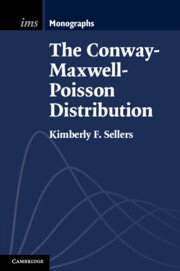Refine search
Actions for selected content:
2721 results in General statistics and probability
1 - Introduction: Count Data Containing Dispersion
-
- Book:
- The Conway–Maxwell–Poisson Distribution
- Published online:
- 02 March 2023
- Print publication:
- 09 March 2023, pp 1-21
-
- Chapter
-
- You have access
- Export citation
4 - Multivariate Forms of the COM–Poisson Distribution
-
- Book:
- The Conway–Maxwell–Poisson Distribution
- Published online:
- 02 March 2023
- Print publication:
- 09 March 2023, pp 124-152
-
- Chapter
- Export citation
6 - COM–Poisson Control Charts
-
- Book:
- The Conway–Maxwell–Poisson Distribution
- Published online:
- 02 March 2023
- Print publication:
- 09 March 2023, pp 218-250
-
- Chapter
- Export citation
Acknowledgments
-
- Book:
- The Conway–Maxwell–Poisson Distribution
- Published online:
- 02 March 2023
- Print publication:
- 09 March 2023, pp xxiii-xxiv
-
- Chapter
- Export citation
Tables
-
- Book:
- The Conway–Maxwell–Poisson Distribution
- Published online:
- 02 March 2023
- Print publication:
- 09 March 2023, pp xiv-xx
-
- Chapter
- Export citation
5 - COM–Poisson Regression
-
- Book:
- The Conway–Maxwell–Poisson Distribution
- Published online:
- 02 March 2023
- Print publication:
- 09 March 2023, pp 153-217
-
- Chapter
- Export citation
Dedication
-
- Book:
- The Conway–Maxwell–Poisson Distribution
- Published online:
- 02 March 2023
- Print publication:
- 09 March 2023, pp v-vi
-
- Chapter
- Export citation
Index
-
- Book:
- The Conway–Maxwell–Poisson Distribution
- Published online:
- 02 March 2023
- Print publication:
- 09 March 2023, pp 327-330
-
- Chapter
- Export citation
Figures
-
- Book:
- The Conway–Maxwell–Poisson Distribution
- Published online:
- 02 March 2023
- Print publication:
- 09 March 2023, pp xii-xiii
-
- Chapter
- Export citation
Frontmatter
-
- Book:
- The Conway–Maxwell–Poisson Distribution
- Published online:
- 02 March 2023
- Print publication:
- 09 March 2023, pp i-iv
-
- Chapter
- Export citation
3 - Distributional Extensions and Generalities
-
- Book:
- The Conway–Maxwell–Poisson Distribution
- Published online:
- 02 March 2023
- Print publication:
- 09 March 2023, pp 71-123
-
- Chapter
- Export citation
7 - COM–Poisson Models for Serially Dependent Count Data
-
- Book:
- The Conway–Maxwell–Poisson Distribution
- Published online:
- 02 March 2023
- Print publication:
- 09 March 2023, pp 251-283
-
- Chapter
- Export citation

The Conway–Maxwell–Poisson Distribution
-
- Published online:
- 02 March 2023
- Print publication:
- 09 March 2023
References
-
- Book:
- Exponential Families in Theory and Practice
- Published online:
- 25 November 2022
- Print publication:
- 15 December 2022, pp 239-242
-
- Chapter
- Export citation
3 - Generalized Linear Models
-
- Book:
- Exponential Families in Theory and Practice
- Published online:
- 25 November 2022
- Print publication:
- 15 December 2022, pp 88-140
-
- Chapter
- Export citation
Frontmatter
-
- Book:
- Exponential Families in Theory and Practice
- Published online:
- 25 November 2022
- Print publication:
- 15 December 2022, pp i-iv
-
- Chapter
- Export citation
Introduction
-
- Book:
- Exponential Families in Theory and Practice
- Published online:
- 25 November 2022
- Print publication:
- 15 December 2022, pp xi-xii
-
- Chapter
- Export citation
Preface
-
- Book:
- Exponential Families in Theory and Practice
- Published online:
- 25 November 2022
- Print publication:
- 15 December 2022, pp vii-viii
-
- Chapter
- Export citation
4 - Curved Exponential Families, Empirical Bayes, Missing Data, and Stability of the MLE
-
- Book:
- Exponential Families in Theory and Practice
- Published online:
- 25 November 2022
- Print publication:
- 15 December 2022, pp 141-182
-
- Chapter
- Export citation
5 - Bootstrap Confidence Intervals
-
- Book:
- Exponential Families in Theory and Practice
- Published online:
- 25 November 2022
- Print publication:
- 15 December 2022, pp 183-238
-
- Chapter
- Export citation
